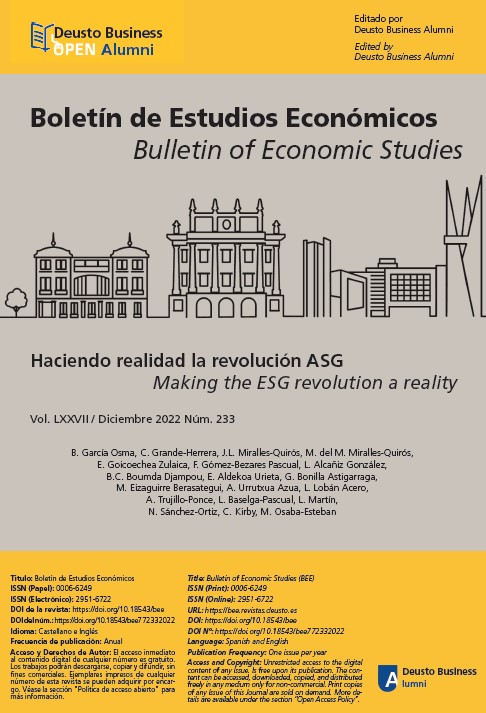Inversión socialmente responsable: aspectos económicos y psicológicos en la gestión de fondos de inversión
Resumen
Los datos proporcionados por organismos tanto nacionales como internacionales revelan el interés creciente que los inversores particulares manifiestan hacia los fondos de inversiones sostenibles y responsables (ISR). Si bien desean rentabilidades positivas, dichos inversores esperan de esos fondos una inversión en activos que cumplen criterios ambientales, sociales y de gobierno corporativo (ASG). Estos criterios imponen una clara limitación en las estrategias que los gestores de fondos ISR pueden aplicar. ¿El doble objetivo financiero y ético implica un comportamiento diferencial de los gestores de fondos ISR? El propósito principal de este artículo es proporcionar una visión económica y psicológica de los ISR. Analizaremos desde la revisión bibliográfica si existen diferencias de rentabilidad entre fondos convencionales y fondos ISR e investigaremos la relación entre rentabilidad y flujo de dinero y la existencia del efecto disposición en ISR, con el fin de ofrecer a los gestores y a los inversores una visión global para sus tomas de decisiones financieras.
Recibido: 06 julio 2022
Aceptado: 21 julio 2022
Citas
An, L., Engelberg, J., Henriksson, M., Wang, B., & Williams, J. (2019). The portfolio-driven disposition effect. Working Paper, Available at SSRN 3126997 https://papers.ssrn.com/sol3/papers.cfm?abstract_id=3126997
Andreu, L., Ortiz, C., & Sarto, J. L. (2020). Disposition effect in fund managers. Fund and stock-specific factors and the upshot for investors. Journal of Economic Behavior & Organization, 176, 253-268.
Arefeen, S., & Shimada, K. (2020). Performance and Resilience of socially responsable investing (SRI) and conventional funds during different shocks in 2016: evidence from Japan. Sustainability, 12(2), 540.
Bauer, R., Koedijk, K., & Otten, R. (2005). International evidence on ethical mutual fund performance and investment style. Journal of Banking & Finance, 29(7), 1751-1767.
Benson, K. L., Brailsford, T. J., & Humphrey, J. E. (2006). Do socially responsable fund managers really invest differently? Journal of Business Ethics, 65(4), 337-357.
Benson, K. L., & Humphrey, J. E. (2008). Socially responsible investment funds: Investor reaction to current and past returns. Journal of Banking & Finance, 32(9), 1850-1859.
Bollen, N. P. (2007). Mutual fund attributes and investor behavior. Journal of Financial and Quantitative Analysis, 683-708.
Boumda, B., Duxbury, D., Ortiz, C., & Vicente, L. (2021). Do Socially Responsible Investment Funds Sell Losses and Ride Gains? The Disposition Effect in SRI Funds. Sustainability, 13(15), 8142.
Capelle-Blancard, G., & Monjon, S. (2014). The performance of socially responsable funds: Does the screening process matter? European Financial Management, 20(3), 494-520.
Cici, G. (2012). The prevalence of the disposition effect in mutual funds’ trades. Journal of Financial and Quantitative Analysis, 47(4), 795-820.
Chevalier, J., & Ellison, G. (1997). Risk taking by mutual funds as a response to incentives. Journal of Political Economy, 105(6), 1167-1200.
Choi, S. H., & Chhabria, M. (2013). Window dressing in mutual fund portfolios: fact or fiction? Journal of Financial Regulation and Compliance, 21(2), 136-149.
Cortez, M. C., Silva, F., & Areal, N. (2009). The Performance of European Socially Responsible Funds. Journal of Business Ethics, 87(4), 573–588.
Curtis, Q., Fisch, J., & Robertson, A. Z. (2021). Do ESG mutual funds deliver on their promises? Michigan Law Review, 120, 393-450.
DeBondt, W., Forbes, W., Hamalainen, P., & Muradoglu, Y. G. (2010). What can behavioural finance teach us about finance? Qualitative Research in Financial Markets, 2(1), 29-36.
Durán-Santomil, P., Otero-González, L., Correia-Domingues, R. H., & Reboredo, J. C. (2019). Does sustainability score impact mutual fund performance? Sustainability, 11(10), 2972.
Eurosif (2018). European SRI Study – Eurosif 2018. Brussels.
Fernández-Izquierdo, M. A., Muñoz-Torres, M. J., Escrig-Olmedo, E., Rivera-Lirio, J. M., & Ferrero-Ferrero, I. (2018). Las agencias de calificación de la sostenibilidad, impulsoras de la inversión socialmente responsable. Boletín de Estudios Económicos, 73(224), 367-385.
Ferreira, M. A., Keswani, A., Miguel, A. F., & Ramos, S. B. (2012). The flow-performance relationship around the world. Journal of Banking & Finance, 36(6), 1759-1780.
Gil-Bazo, J., Ruiz-Verdú, P., & Santos, A. A. (2010). The performance of socially responsible mutual funds: The role of fees and management companies. Journal of Business Ethics, 94(2), 243-263.
Global Sustainable Investment alliance. (2018). Global Sustainable Investment Review 2018. http://www.gsi-alliance.org/wp-content/uploads/2019/06/GSIR_Review2018F.pdf
Humphrey, J. E., Warren, G. J., & Boon, J. (2016). What is different about socially responsable funds? A holdings-based analysis. Journal of Business Ethics, 138(2), 263-277.
Hung, P. H., Lien, D., & Kuo, M. S. (2020). Window dressing in equity mutual funds. The Quarterly Review of Economics and Finance, 78, 338-354.
Kahneman, D., & Tversky, A. (1979). Prospect Theory: An Analysis of Decision under Risk. Econometrica, 47(2), 263-292.
Kempf, A., & Osthoff, P. (2007). The effect of socially responsible investing on portfolio performance. European Financial Management, 13(5), 908-922.
Kempf, A., & Osthoff, P. (2008). SRI funds: Nomen est omen. Journal of Business Finance & Accounting, 35(9-10), 1276-1294.
Leal, C. C., Armada, M. J. R., & Duque, J. C. (2010). Are all individual investors equally prone to the disposition effect all the time? New evidence from a small market. Frontiers in Finance and Economics, 7(2), 38-68.
Lean, H. H., Ang, W.R., & Smyth, R. (2015). Performance and performance persistence of socially responsible investment funds in Europe and North America.
Markowitz, H. (1952). The utility of wealth. Journal of political Economy, 60(2), 151-158.
Marques, M. R., Sampaio, J. O., & Silva, V. A. B. (2019). Window dressing in Brazilian investment funds. Revista Contabilidade & Finanças, 31, 116-128.
Muñoz, F., Ortiz, C., & Vicente, L. (2022). Ethical Window Dressing: SRI Funds are as Good as their Word. Finance Research Letters, 49, 103109.
Nofsinger, J., & Varma, A. (2014). Socially responsible funds and market crises. Journal of Banking & Finance, 48, 180-193.
Ortiz, C., Ramírez, G., & Sarto, J. L. (2013). Assessment of window dressing using fund returns and portfolio holdings. The Spanish Review of Financial Economics, 11(2), 85-93.
Paluzie, A. P. (2020). Origen, desarrollo y futuro de las inversiones socialmente responsables (ISR). Revista Española de Capital Riesgo, (2), 39-58.
Renneboog, L., Ter Horst, J., & Zhang, C. (2008). Socially responsible investments: Institutional aspects, performance, and investor behavior. Journal of Banking & Finance, 32(9), 1723-1742.
Renneboog, L., Ter Horst, J., & Zhang, C. (2011). Is ethical money financially smart? Nonfinancial attributes and money flows of socially responsible investment funds. Journal of Financial Intermediation, 20(4), 562-588.
Riedl, A., & Smeets, P. (2017). Why do investors hold socially responsible mutual funds? The Journal of Finance, 72(6), 2505-2550.
Rudd, A. (1981). Social Responsibility and Portfolio Performance. California Management Review, 23(4), 55–61.
Schueth, S. (2003). Socially responsible investing in the United States. Journal of business ethics, 43(3), 189-194.
Schwartz, M. S. (2003). The” ethics” of ethical investing. Journal of business ethics, 43(3), 195-213.
Sharpe, W. F. (1964). Capital asset prices: A theory of market equilibrium under conditions of risk. The journal of finance, 19(3), 425-442.
Shefrin, H., & Statman, M. (1985). The disposition to sell winners too early and ride losers too long: Theory and evidence. The Journal of Finance, 40(3), 777-790.
Sirri, E. R., & Tufano, P. (1998). Costly search and mutual fund flows. The Journal of Finance, 53(5), 1589-1622.
Spainsif (2021). La inversión sostenible y responsable en España – Estudio Spainsif 2021. Madrid.
Summers, B., & Duxbury, D. (2012). Decision-dependent emotions and behavioral anomalies. Organizational Behavior and Human Decision Processes, 118(2), 226-238.
Viviers, S., & Eccles, N. S. (2012). 35 years of socially responsible investing (SRI) research-general trends over time. South African Journal of Business Management, 43(4), 1-16.
Licencia:
Los trabajos publicados en esta revista desde 2021 se encuentran disponibles bajo la licencia Creative Commons Attribution-NonCommercial 4.0 International - CC BY-NC 4.0. La actual política de acceso abierto de la revista no se aplica a los contenidos previos 2021.
Derechos de los autores/as:
Los autores y las autoras conservan los derechos de autor/a sobre sus trabajos publicados en el Boletín de Estudios Económicos y conceden a éste derechos no exclusivos para la explotación de los trabajos con fines de maquetación, publicación y difusión. Esta licencia permite al Boletín de Estudios Económicos distribuir, reproducir y difundir los trabajos en su plataforma y otros medios, siempre bajo las condiciones descritas en este aviso.
Derechos de los lectores/as:
Los lectores y las lectoras pueden leer, descargar, imprimir, buscar, compartir (copiar, redistribuir o enlazar textos completos), o adaptar (remezclar, transformar y construir a partir del material) el contenido, siempre que:
- No se utilicen los materiales con fines comerciales.
- Se cite adecuadamente el trabajo original, incluyendo el nombre de la persona autora y la fuente.
- Se indique claramente cualquier modificación realizada al contenido original.
El uso comercial de los materiales está prohibido sin el permiso expreso de las personas autoras. Para mayor claridad, se considera uso comercial cualquier actividad que tenga como fin la obtención de beneficios económicos o que implique un intercambio comercial directo.
Condiciones de uso:
El uso del contenido no debe infringir los derechos de otras personas, ni debe ser utilizado de manera que pueda dañar la reputación del/la autor/a o del Boletín de Estudios Económicos.
Responsabilidad por el contenido:
Los/las autores/as son responsables del contenido de sus trabajos y el Boletín de Estudios Económicos no se hace responsable de las opiniones expresadas en los mismos.
Más información:
Política de Acceso Abierto, Licencia y Derechos de Autor/a


.jpg)
.jpg)
.jpg)







